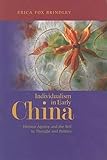Individualism in Early China : Human Agency and the Self in Thought and Politics / Erica Fox Brindley.
Material type: TextPublisher: Honolulu : University of Hawaii Press, [2010]Copyright date: ©2010Description: 1 online resource (240 p.)Content type:
TextPublisher: Honolulu : University of Hawaii Press, [2010]Copyright date: ©2010Description: 1 online resource (240 p.)Content type: - 9780824833862
- 9780824860677
- 320
- online - DeGruyter
- Issued also in print.
| Item type | Current library | Call number | URL | Status | Notes | Barcode | |
|---|---|---|---|---|---|---|---|
 eBook
eBook
|
Biblioteca "Angelicum" Pont. Univ. S.Tommaso d'Aquino Nuvola online | online - DeGruyter (Browse shelf(Opens below)) | Online access | Not for loan (Accesso limitato) | Accesso per gli utenti autorizzati / Access for authorized users | (dgr)9780824860677 |
Browsing Biblioteca "Angelicum" Pont. Univ. S.Tommaso d'Aquino shelves, Shelving location: Nuvola online Close shelf browser (Hides shelf browser)

|

|

|

|

|

|

|
||
| online - DeGruyter Dharma / | online - DeGruyter Hokkeji and the Reemergence of Female Monastic Orders in Premodern Japan / | online - DeGruyter Adapted for the Screen : The Cultural Politics of Modern Chinese Fiction and Film / | online - DeGruyter Individualism in Early China : Human Agency and the Self in Thought and Politics / | online - DeGruyter Transformative Journeys : Travel and Culture in Song China / | online - DeGruyter Chinese Writing and Calligraphy / | online - DeGruyter The Three Sui Quash the Demons' Revolt : A Comic Novel Attributed to Luo Guanzhong. |
Frontmatter -- Contents -- Preface -- Acknowledgments -- Introduction -- Chapter one. Individual Agency and Universal, Centralized Authority in Early Mohist Writings -- Chapter two. Centralizing Control -- Chapter three. Decentralizing Control and Naturalizing Cosmic Agency -- Chapter four. Two Prongs of the Debate -- Chapter five. Servants of the Self and Empire -- Chapter six. Conclusion -- Postscript: A Note on Chinese Individualism, Human Rights, and the Asian Values Debate -- Notes -- Works Cited -- Index -- About the Author
restricted access online access with authorization star
http://purl.org/coar/access_right/c_16ec
Conventional wisdom has it that the concept of individualism was absent in early China. In this uncommon study of the self and human agency in ancient China, Erica Fox Brindley provides an important corrective to this view and persuasively argues that an idea of individualism can be applied to the study of early Chinese thought and politics with intriguing results. She introduces the development of ideological and religious beliefs that link universal, cosmic authority to the individual in ways that may be referred to as individualistic and illustrates how these evolved alongside and potentially helped contribute to larger sociopolitical changes of the time, such as the centralization of political authority and the growth in the social mobility of the educated elite class.Starting with the writings of the early Mohists (fourth century BCE), Brindley analyzes many of the major works through the early second century BCE by Laozi, Mencius, Zhuangzi, Xunzi, and Han Feizi, as well as anonymous authors of both received and excavated texts. Changing notions of human agency affected prevailing attitudes toward the self as individual-in particular, the onset of ideals that stressed the power and authority of the individual, either as a conformist agent in relation to a larger whole or as an individualistic agent endowed with inalienable cosmic powers and authorities. She goes on to show how distinctly internal (individualistic), external (institutionalized), or mixed (syncretic) approaches to self-cultivation and state control emerged in response to such ideals. In her exploration of the nature of early Chinese individualism and the various theories for and against it, she reveals the ways in which authors innovatively adapted new theories on individual power to the needs of the burgeoning imperial state. With clarity and force, Individualism in Early China illuminates the importance of the individual in Chinese culture. By focusing on what is unique about early Chinese thinking on this topic, it gives readers a means of understanding particular "Chinese" discussions of and respect for the self.
Issued also in print.
Mode of access: Internet via World Wide Web.
In English.
Description based on online resource; title from PDF title page (publisher's Web site, viewed 02. Mrz 2022)


